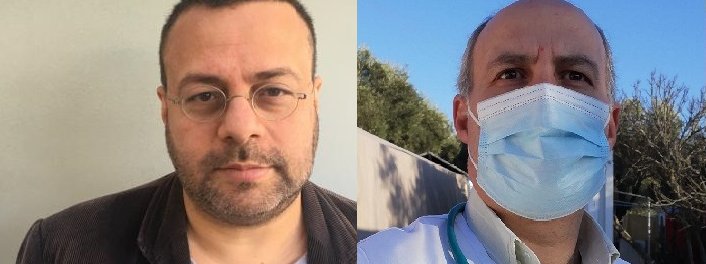On September 30th, 2021, Dr. Apostolos Veizis, Executive Director of INTERSOS Hellas, joined SKAI 100.3’ s radio show “Stigmiotypa” (meaning: Candid Shots) in order to speak with the journalist Vasilis Koufopoulos focusing on the necessity of the vaccination process of refugees, migrants and undocumented people.

He emphasized on the issue, saying:
“Public health should concern all of us and especially when it comes to COVID which does not discriminate, I think we as a society should not discriminate either. And all of us should have access and accessibility to the good we call a vaccine.
It’ s about an effort that this moment after many months of work, finally reaches the Parliament, which will give the opportunity to the undocumented people to be vaccinated. Of course, what’ s essential in this case is not to relate this to legal status they currently have in Greece.
So, whoever is to be vaccinated, will not be arrested. This is what matters. Secondly, the sooner refugees, migrants and undocumented people get vaccinated, the better we will tackle the pandemic. The main problem that we didn’ t address the past two years was the inclusion of all the people living in Greece regarding the planning and the implementation of such programs.
There are two crucial matters to discuss. I have to mention that COVID was used in the recent past to criminalize refugees and asylum seekers in the camps on the islands where the COVID consequences were three times worse compared to those affecting the general public and two and a half times worse than those affecting camps in the mainland.
A lot of people don’ t have access to valid information. There is misinformation deriving from various sources. We would engage more people in the process of vaccination but our country is one of the few where information to the public is not provided in other languages but only in greek and sometimes in English. And like in other European countries, if we had overcome various bureaucratic and governmental issues by simplifying them, the number of people that would have the need and the will to be vaccinated would be even higher.
On one hand, there are people working in the agricultural sector and on the other hand, there are those who fear of getting vaccinated. Both of these communities cross each other. And I think that all of us in our daily lives we give and take from each other. At this point, we should stay focused on each and every person regardless of their skin color and language, when it comes to planning any action.
It’ s about time we proceeded to the proper management of these groups in the greek countryside whether we are talking about Peloponnesus, or Crete, or Thessaly or Epirus. There are hundreds of thousands of farmers who are isolated and living in terrible conditions including crowded spaces which means that they are at greater risk of getting infected by COVID.
Thus, the first step we should take is approaching these people and in this way we are giving them the opportunity not only to visit public health centers, but I think the main aim of this law is to allow public medical stuff and NGOs to reach these places with mobile units to expedite the vaccination process.
No one is left out in this pandemic. Currently, in our planning for this, or the next, or any other crisis that is to come, if we possess the proper means and have the right responses, I believe we will have less negative repercussions on the general public whether that concerns morbidity or mortality rate. I think that public health is a vital part of our society and our society should accordingly make a good use of its priorities and resources in this cause. Public health matters. No one should be excluded”.
